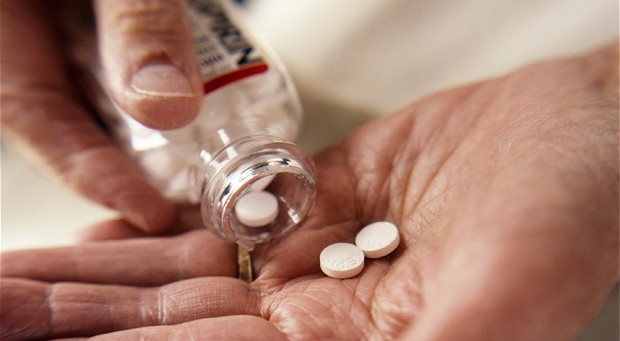
Taking a daily dose of aspirin can help prevent both cardiovascular disease and colorectal cancer in some groups of adults, top U.S. experts in preventive medicine have determined.
In a draft report published Monday, the U.S. Preventive Services Task Force (USPSTF) — an independent advisory panel of medical experts — concluded that there is now sufficient evidence to support the use of aspirin to reduce the risk of heart attacks, stroke, and colorectal cancer in certain high-risk groups.
The updated guidance marks the first time any major medical group has endorsed the combined benefits of aspirin in preventing cardiovascular problems and colorectal cancer — conditions that collectively kill hundreds of thousands of Americans each year.
The question of whether or not aspirin should be used in the prevention of either cancer or cardiovascular problems in people without a prior history – known as primary prevention, or preventing disease before it happens — has been the subject of ongoing scientific debate. While many medical groups, like the American Heart Association, recommend daily aspirin to lower heart disease risk in people at increased risk with or without a history of heart attack or stroke, not all agencies agree. The Food and Drug Administration actually issued a warning against routinely taking aspirin to prevent a first heart attack or stroke, and denied Bayer’s request to add an indication for primary cardiovascular prevention to the label for aspirin.
But scientific data reviewed by the task force was strong enough to conclude that the primary preventive benefits of daily aspirin outweigh the potential risks, at least in certain groups of adults who are at increased risk of cardiovascular disease.
Specifically, here’s what the task force found in their review of the evidence:
- People in their 50s who are at an increased risk of cardiovascular disease might want to consider taking low-dose aspirin to help prevent heart attacks and strokes, as well as colorectal cancer.
- The group they’re recommending take aspirin daily is very narrow, however: “Adults ages 50 to 59 years who have a 10 percent or greater 10-year [cardiovascular disease] risk, are not at increased risk for bleeding, have a life expectancy of at least 10 years, and are willing to take low-dose aspirin daily for at least 10 years.”
- For people in their 60s, there are still benefits to taking daily aspirin, but they must be weighed against the fact that the risk of bleeding in this group is higher. For those people, the panel says, advice on taking aspirin should be individualized, since the evidence is too mixed to make broad recommendations. (And there’s not enough clear evidence on the benefits of aspirin for those older than 70 or younger than 50.)
- Because aspirin prevents blood clot formation — which causes heart attacks and some types of stroke — it can also increase the risk of bleeding. So this means anyone who has, for example, a history of stomach ulcers and who wants to take aspirin for prevention needs to balance the heart and cancer benefits they’d get with the bleeding risk.
The new guidance means that more Americans should be taking aspirin, the task force said. Among adults eligible for aspirin therapy and at increased risk for cardiovascular disease, only about 41 percent have been told by a physician to take aspirin. This indicates that many of those who would benefit the most from aspirin are not currently taking it.
At the same time, the guidance makes it clear that daily aspirin is not beneficial for everyone, especially those who are not in a higher-risk category for cardiovascular disease and colorectal cancer.
But for those who are at risk, aspirin can have a pretty significant effect. According to the panel’s estimates, long-term daily aspirin use may prevent as many as 25 to 30 heart attacks per 1,000 people, and it cuts the risk of colorectal cancer by as much as 40 percent in some.
So how do you know if you are among those who would benefit from aspirin? Several groups including the American Heart Association offer online calculators to help you figure out your cardiovascular risk, which, along with discussion with a health care provider, can help determine whether daily aspirin might be right for you.
